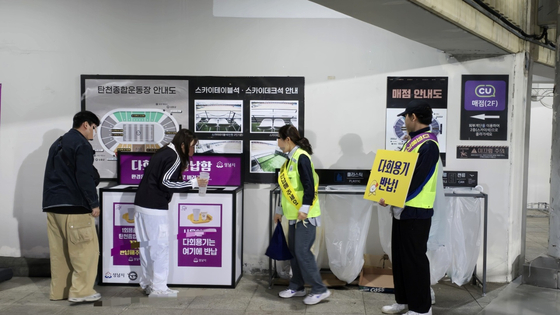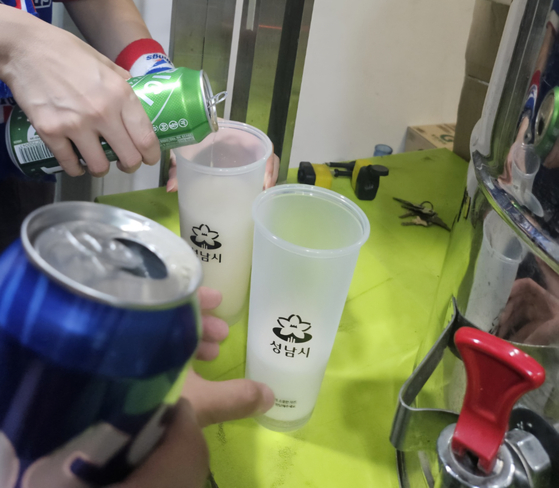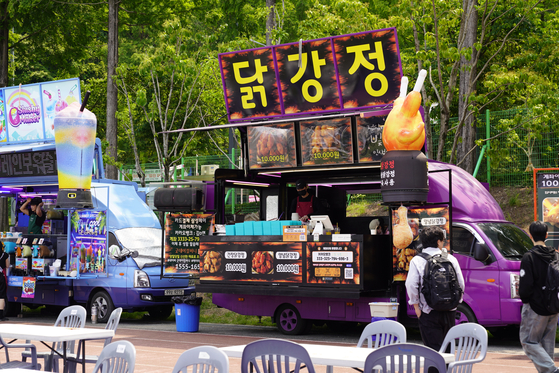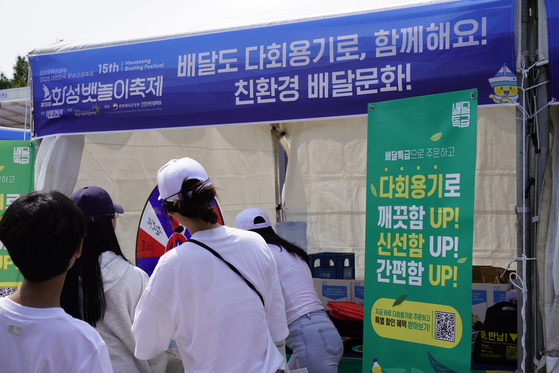How Korean Stadiums Are Winning the War on Plastic Waste

Reusable cups and containers used at the Tancheon Stadium in Seongnam, Gyeonggi [SEONGNAM CITY]
Spectators at Tancheon Stadium in Seongnam, Gyeonggi, are increasingly seen with light brown trays holding snacks like tteokbokki (spicy rice cakes) and fried chicken.
These trays are part of a new initiative introducing reusable containers to the stadium.
According to the Seongnam city government on Monday, since May 24, four concession stands and five food trucks inside the home stadium of Seongnam FC have been using the new containers. A total of 1,000 trays and 1,000 cups are deployed at each game, with 13 matches scheduled through the end of the year, totaling 26,000 units. Used containers are neatly stacked in eight return bins placed at entrances and throughout the stadium.
"The amount of trash around the stadium has noticeably decreased," said Kim Yu-jin, 53, a Seongnam FC fan.
"With the help of 28 volunteer guides and a Seongnam FC promotion offering a prize draw for returning containers, the return rate reached 97 percent," said a city official. “Since adopting reusable containers, the amount of plastic waste has dropped by more than half."
The stadium, once notorious for its trash piles, is undergoing a transformation. As disposable waste plummets, the effort is being praised for fostering a culture of sustainability. Reusable containers are also being adopted at public institutions and festivals.

Reusable cups and containers used at the Tancheon Stadium in Seongnam, Gyeonggi [SEONGNAM CITY]
Suwon World Cup Stadium, which began using reusable containers for all food trucks and concession stands on May 11, reduced waste by 308 kilograms (679 pounds) over the course of three matches held on May 11, May 25 and June 1. Of the 7,530 containers used, 98 percent were returned.
“We made the containers blue, the team color of Suwon Samsung Bluewings, and spectators responded well,” said an official from the Korea Gyeonggido Company, a company co-founded by small- and medium-sized companies in Gyeonggi.
Other K League stadiums, such as Yi Sun-sin Stadium, home to Chungnam Asan FC, and Daejeon World Cup Stadium, home to Daejeon Hana Citizen, are also using reusable containers.
The trend is catching on in professional baseball. Of the nine KBO stadiums, seven now use reusable containers, including Suwon’s KT Wiz Park and Incheon’s SSG Landers Field.

Reusable containers used at a festival in Gyeonggi [GYEONGGI PROVINCE]
"Of the 39 food vendors in the stadium, 31 use reusable containers," said a spokesperson for SSG Landers. “The remaining vendors are unable to participate due to brand policies or because their food items don’t fit the containers."
The food delivery sector was among the first to adopt reusable containers. The explosion of contactless deliveries during the Covid-19 pandemic led to a surge in plastic waste, prompting the shift.
In 2021, Gyeonggi began offering reusable container services through the public delivery app Baedal Teukgeup. Last year alone, around 240,000 orders were placed using the service. Since then, reusable items like tumblers and mugs have been introduced at public institutions and multiuse facilities such as funeral homes.
Reusable containers have also made their way to local and university festivals. According to the Environment Ministry, 340 out of 1,170 festivals organized by local governments last year used reusable containers. At the Wild Plants Festival held in Yangpyeong County, Gyeonggi, from April 25 to 27, waste was reduced by more than 90 percent.

Reusable containers used at a festival in Gyeonggi [GYEONGGI PROVINCE]
"A survey of 620 visitors found that 92 percent responded 'very positively' to the initiative," according to a country official.
One ongoing challenge is the container return rate. Because attendees must locate a return bin, rates hover between 50 and 60 percent.
“Many people mistake the reusable containers for disposable ones and throw them in the regular trash,” said an official from a local government.
In response, institutions are adding more return bins and implementing deposit systems requiring users to pay between 500 and 1,000 won (37 and 76 cents). In 2023, Gyeonggi’s return rate was only 60 percent, but that has risen to between 93 and 98 percent this year after doubling the number of return stations and launching lunchtime awareness campaigns.
“We need to move beyond event-based usage and find ways to encourage reusable containers in everyday settings like cafes and restaurants,” said a member of the Gyeonggi chapter of the Korea Federation for Environmental Movements.
Translated from the JoongAng Ilbo using generative AI and edited by Korea JoongAng Daily staff.
BY CHOI MO-RAN [yoon.soyeon@joongang.co.kr]
Post a Comment for "How Korean Stadiums Are Winning the War on Plastic Waste"
Post a Comment